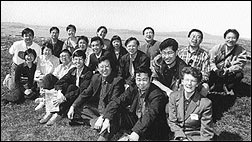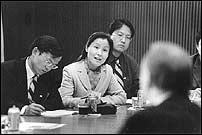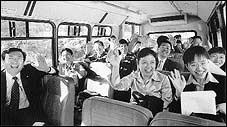![]()
![]()
![]()
![]()
![]()
![]()
A Grand Tour for
Friends from China
Peking University Leaders Visit Berkeley for Month-Long Crash Course in Campus Administration
By Cathy
Cockrell, Public Affairs
Posted March 22, 2000
|
|
|
The 16 Peking University officials, here in the U.S. to learn how top-flight American universities operate, met with Chancellor Berdahl and dozens of Berkeley vice-chancellors and administrators to discuss everything from faculty recruitment, fundraising and fiscal management to student food service and lab animal care. The delegates toured dorms, botanical collections and scientific laboratories, where investigators described research on such far-flung subjects as hyenas, asphalt and extraterrestrial life.
"You opened every door in Berkeley. We are moved so much," said Peking University Vice President He Fangchuan. "Our president, executive vice president and vice president all visited Berkeley."
Delegation Vice President Hao Ping, Peking University assistant president and director of internal relations, was moved to quantify the experience: "I calculated this morning," he said on the final day of the delegation's official visit to campus. "We heard 25 presentations, took 18 tours of campus facilities and met more than 300 administrators!"
"We call ourselves Berkeley students," said Hao. "We are studying with Chancellor Berdahl and the vice chancellors."
The Chinese delegates -- most of them still in their 30s and 40s -- direct many branches of Peking University, including scientific research, human resources, development and planning, foreign students and undergraduate recruitment.
"The 21st century Peking University is staying at Berkeley now," said Vice President He. "The delegation members will play a very important role in the university's future."
|
|
Like Berkeley, Peking University is a research institution with a large and diverse student body (totaling 30,000) and a beautiful campus (theirs is located in Beijing on the grounds of a Ming Dynasty emperor's estate).
Many delegates were struck by the fact that Berkeley, though public, receives only about a third of its budget from state funding. "We have similar problems," Hao noted. "We need to learn how to do fundraising."
To address this interest, one afternoon of the training was devoted exclusively to development activities.
Delegates noted that Peking University receives only a small proportion of its budget from tuition, since it charge only a nominal fee to undergraduates, while graduate students attend for free.
Other contrasts stood out. Many were surprised by the far larger proportion of staff to faculty at Berkeley, the size of the budget for student activities ($17 million at Berkeley, versus $100,000 at Peking University), and by faculty recruitment and promotion issues.
"Human relations is very different," said Office of the President Program Coordinator Lei Hong, who plans to study higher education administration at the Graduate School of Education before returning to China. When Peking University hires a new faculty member, it also finds housing for the family and a suitable local job for the spouse. "You're recruiting not one person, but two," Hong said.
Professor Hao was struck by differences in the classroom.
|
|
|
Such recommendations are likely to impact not only Peking University, but institutions throughout the People's Republic of China, which is retooling its educational system to serve the transition from a central planning to a free market economic model.
The Peking University officials, once they return home, will prepare an extensive report and meet face-to-face with National Minister of Education Madame Chen to discuss what they learned at Berkeley and more than 10 other American institutions they will visit during the coming month.
![]()
![]()
March 22 - April 5,
2000 (Volume 28, Number 26)
Copyright 2000, The Regents of the University of
California.
Produced and maintained by the Office
of Public Affairs
at UC
Berkeley.
Comments? E-mail berkeleyan@pa.urel.berkeley.edu.


